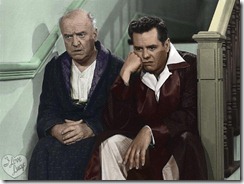 Last week I was watching a rerun of “I Love Lucy” and got to thinking: What if we fast-forwarded Ricky and Fred into today’s marketplace to see how their career choices would have turned out?
Last week I was watching a rerun of “I Love Lucy” and got to thinking: What if we fast-forwarded Ricky and Fred into today’s marketplace to see how their career choices would have turned out?
And what if we did the same exercise with our chosen professions? Will our choices stand the test of time? And should they?
You may remember that Ricky was a Cuban singer and band leader in a New York City nightclub. Fast-forward Ricky’s profession to this day and age, and there’s a good possibility Ricky would be out of work, what with the rise of rock ’n’ roll and the demise of live big band shows in NYC. At the very least, Ricky would need to reinvent himself.
Now Fred, he’s a different story.
Both he and Ethel were former vaudevillians. Fred lived through the Great Depression and was known for his penny-pinching nature. After vaudeville, Fred used his savings to purchase an NYC apartment building.
Fast-forward Fred’s profession— owner of an apartment building on the Upper East Side of Manhattan—to today, and he seems to have made a pretty good choice.
Who knows how time and the resulting social and economic changes may impact our career choices?
My husband is a certified public accountant and tax director at a local firm, a job that may be around a very long time, given our ever-changing state and federal tax laws.
Besides standing the test of time, his chosen profession doesn’t require significant physical labor like that of a construction worker or a house painter.
And it doesn’t have a mandatory retirement age.
This mean that if my husband chooses to, he may be able to practice his profession for a very long time.
As many of us enter the second half of life, it’s often a time of reflection about our careers. Sometimes our reflection is forced, due to a layoff, decline in income or a change in required skills or technology that makes our job obsolete.
And sometimes our need for reflection comes from within; we simply want to do something different for personal reasons.
Whatever the impetus, now is a great time to think about how long you want or need to work, how long you can continue in your current profession and, if a change is needed, how to find your life calling.
It sounds like a pretty daunting set of questions, but there are some great resources to help.
If you are looking to determine how long you need to work, it’s important to point out that today most Americans plan to work well past age 65.
According to a Gallup poll, the proportion of people aiming to retire early has declined from 50 percent in 1995 to 28 percent in 2011.
U. S. News has a great article on the consideration points for retirement athttps://money.usnews.com/money/retirement/ articles/2012/02/13/how-long should i-work-before-retirement.
If you’re wondering how long you should continue in your current profession, consider the growth potential of your current industry, your own growth potential within your current career, your income requirements and how much recognition and happiness your job brings you.
If you are considering a job change, www.encore.org offers a place to explore, prepare and find a new career. The site offers tools, resources and personal stories to jump-start your exploration. You can even download a 28-page get-started guide.
The site also provides information on top encore professions that are slated to grow in the fields of education, healthcare, environment, government and nonprofits.
Maybe veteran character actor William Frawley—who played Fred on “I Love Lucy”— had other things to teach us, too, like the power of networking.
At age 64, Frawley only came into consideration for his role after he phoned Lucille Ball personally to ask if there was a role for him on her new show.
It was that call that led to a lucrative six-season engagement as Fred Mertz.
Way to go, Fred!


